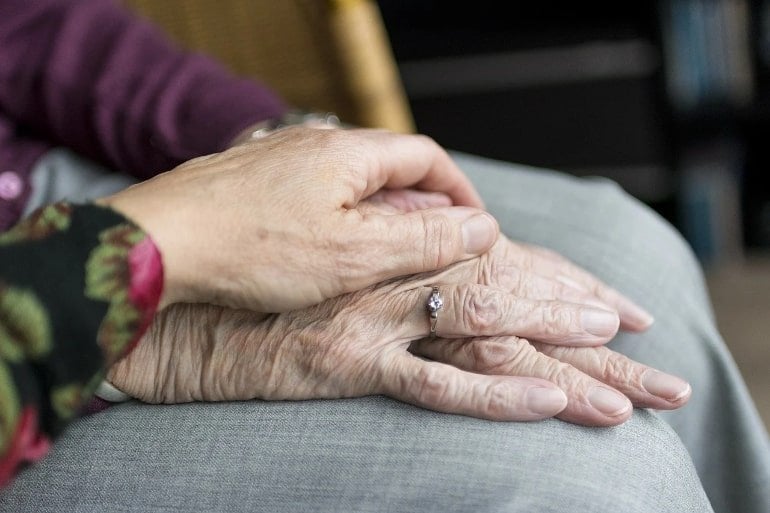Summary: Older adults who experienced physical abuse as children are significantly more likely to develop chronic pain and other chronic health issues. Additionally, they are also three times more likely to develop mental health disorders such as depression and anxiety.
Source: University of Toronto
Older adults who were physically abused as children were significantly more likely to develop chronic pain and chronic physical illness in later life according to a newly-released study by University of Toronto researchers.
They were also twice as likely to develop depression and anxiety disorders compared to those without this early trauma.
“Sadly, our findings suggest that the traumatic experience of childhood physical abuse can influence both physical and mental health many decades later. It also underlines the importance of assessing for adverse childhood experiences among patients of all ages, including older adults,” said Anna Buhrmann, who began this research for her undergraduate thesis in the Bachelor of Arts and Science program at McMaster University, Hamilton, Ontario and is a research assistant at the Institute of Life Course & Aging at the University of Toronto.
The physical illnesses that developed included diabetes, cancer, migraines, arthritis, heart disease, diabetes, and chronic-obstructive pulmonary disease (COPD). The links between childhood abuse and poor physical and mental health persisted even after accounting for income, education, smoking, binge drinking, and other causes of poor health.
“Health professionals serving older adults need to be aware that it is never too late to refer people for counseling. A promising intervention, cognitive behavioral therapy [CBT], has been tested and found effective at reducing post-traumatic stress disorder and depressive and anxiety symptoms among survivors of childhood abuse,” said co-author Professor Esme Fuller-Thomson, who supervised Buhrmann’s thesis research.

Fuller-Thomson is Director of the Institute of Life Course & Aging at the University of Toronto’s Factor-Inwentash Faculty of Social Work.
It was not possible for the cross-sectional study to determine the specific pathways through which experiencing physical abuse as a child affects an individual’s health later in life. Current studies suggest that childhood physical abuse effects several physiological changes, including the dysregulation of systems that regulate the response of the body to stress.
Future prospective research investigating disruptions to these systems that are already linked to several physical and mental illnesses, such as abnormal levels of cortisol, may help to shed light on the experience of childhood abuse victims.
The data for this study were drawn from a representative sample of adults aged 60 and older in the Canadian province of British Columbia. It compared 409 older adults who reported a history of childhood physical abuse to 4,659 of their peers who reported they had not been physical abused during their youth. The data were drawn from the Canadian Community Health Survey.
About this aging and psychology research news
Author: Press Office
Source: University of Toronto
Contact: Press Office – University of Toronto
Image: The image is in the public domain
Original Research: Open access.
“Poorer physical and mental health among older adults decades after experiencing childhood physical abuse” by Anna S. Buhrmann et al. Aging and Health Research
Abstract
Poorer physical and mental health among older adults decades after experiencing childhood physical abuse
Background
A burgeoning literature indicates adverse childhood experiences (ACEs) are associated with poorer adult health outcomes. Most research to date has not focused on the outcomes among Canadian older adults.
Methods
The objectives of the current study were to identify the prevalence and adjusted odds of 2 mental health and 7 physical health conditions among survivors of childhood physical abuse (CPA) aged 60 and older (n = 409) in comparison to their peers who had not been physically abused (n = 4659). Data were drawn from a representative sample of older British Columbians in the Canadian Community Health Survey. Logistic regression analyses took into account sex, race, age, immigration status, marital status, education, income, smoking, obesity, binge drinking and number of other ACEs.
Results
For anxiety, depression and COPD, CPA survivors had adjusted odds ratio more than twice that of their peers (ORanxiety = 2.22; 95% CI = 1.46, 3.38; ORdepression = 2.17; 95% CI = 1.57, 3.01; ORCOPD = 2.03; 95% CI = 1.40, 2.94). For CPA survivors, the adjusted odds ratios were more than 50% higher for cancer (ORcancer = 1.71; 95% CI = 1.31, 2.24), migraine (ORmigraine = 1.67; 95% CI = 1.15, 2.45) and debilitating chronic pain (ORpain = 1.58; 95% CI = 1.22, 2.03), and 33% higher for arthritis (ORarthritis = 1.33; 95% CI = 1.05, 1.69). CPA was not significantly associated with either heart disease (p = 0.15) or diabetes (p = 0.17).
Conclusions
The association between CPA and 2 mental health and 5 physical health conditions remained significant, even after controlling for sociodemographic characteristics, health behaviors and other ACEs. Further research is needed to investigate potential pathways through which childhood physical abuse is linked to a wide range of later-life health problems.







